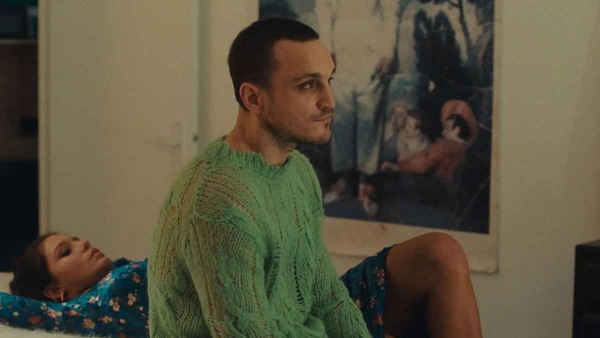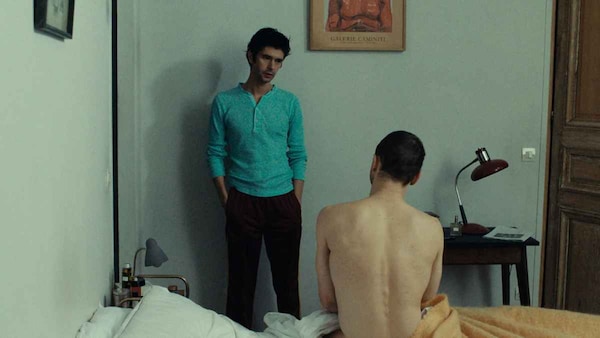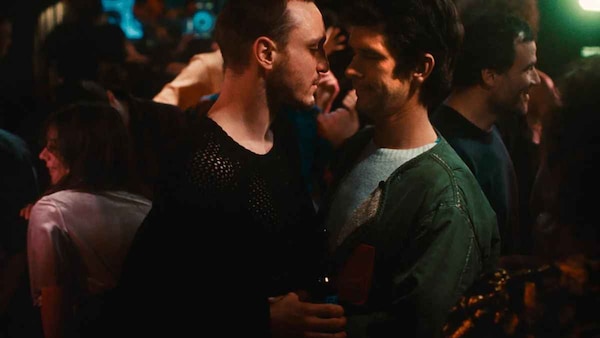Passages Review: Ira Sachs's film bristles with unruly, tangled desires
Franz Rogowski and Adele Exarchopoulos kick up a sensuous and volatile tornado of lust

Last Updated: 06.57 PM, Oct 05, 2023
Story: The film follows Tomas (Franz Rogowski) and Martin (Ben Whishaw), a queer couple in Paris. When Tomas begins a passionate affair with Agathe (Adele Exarchopoulos), a young school teacher, Martin gets into an affair of his own, much to the envy of Tomas.
Review: Centring on the mess that modern-day relationships can become, the Ira Sachs directorial refreshingly chooses a subdued tone that works both for and against the film. While the screenplay, which Sachs co-wrote with Mauricio Zacharias and Arlette Langmann, keenly eschews any big, dramatic confrontations that would have been easy to slip into given the nature of the material, things are palpably and volcanically unsettled beneath the surface. The dramatic effects are deliberately reined in to show its characters as being deeply aware of the habits of one another. So, when Tomas returns to the apartment the morning after his film wrap-up party and confesses to his husband that he had sex with a woman, Agathe, Sachs keeps the entire scene extremely muted. While Tomas tries to make amends and explain himself, saying how he felt something he hadn’t in a long time, Martin calmly reassures him that it is okay. “When you finish a film, you always forget”, Martin’s single sentence eloquently tells us everything we need to know about their relationship. Tomas’s actions are not new; Martin is used to it, including his pathetic, sodden justifications.

Passages circles what it is like being stuck within a loop of a toxic relationship and the conflicted, tumultuous journey it takes to pull oneself out of it. As much as Martin attempts to break himself away from Tomas, the latter, utterly heedless of anyone, barges in and out without the remotest sense of compunction. He barely stays back to deal with the tangle of confusion and uncertainty he creates. Despite moving in with Agathe, he feels entitled enough to turn up at Martin’s, whenever he pleases. Throughout the course of the film, Tomas keeps cycling back and forth between Martin and Agathe, never placing a footing and being conceited enough to believe everyone will just merrily coast along with his impulses. So when he randomly pops up one day at Martin’s and finds another guy in Martin’s bed, he is perturbed and fuming. If he had his way, Martin’s life would solely pivot around him and be available for just him. In his bitter, envious self-absorption, he cannot bear the thought of Martin being with someone else.

Martin cannot help being drawn towards him time and again, in spite of having little delusion regarding the terrible decision he is making in sticking with him, having faith in him. He keeps falling for his emotional manipulations. Agathe also is left scathed by her relationship with Tomas. There were times I wanted to reach out across the screen and give both Martin and Agathe a good shake-up and make them finally accept that being around Tomas only entails heading for continued disasters and a constant emotional toll. Sachs recognises the difficult and painful process of trying to tear oneself away from toxicity. The compulsion is equally on Martin and Agathe to see and gauge what’s best for them and ultimately concede to withdrawing from Tomas and his damaging ways.
Tomas’s penchant is not for imprudence but that of utter, spectacular irresponsibility and complete lack of understanding about the other’s feelings. That someone else can be hurt somehow doesn’t seem to register in his extreme narcissistic worldview. In the film’s opening scene, Tomas is rendered as this exacting filmmaker, barking at people for not failing to adhere to his precise directions. In his personal life, however, Tomas acts like he has no control over his decisions, being as freely, and wildly impetuous as imaginable, taking not an ounce of accountability for his deeds. He does not care for consequences and, as someone tells Martin, he is the kind of person whom you cannot really change despite your best efforts. He hurtles towards his whims, blasé about their impact even if it shatters those around him. At a dinner when Agathe’s parents are visiting, Tomas, deliberately provocative in a leopard print crop top, gives just enough peek into his headstrongness.

Earlier, he has the audacity to even suggest to Martin that he must be patient with him, while he throws caution to the wind. In one scene, after making out with Martin in the room next to Agathe’s, he curls back into her bed in the middle of the night, wholly unaffected by the implications and effects of his behaviour. It is only in the electric ending there is a semblance of his feelings and the elaborate chaos he has wrought finally catching up with him.

This is a deeply unlikeable character, who almost revels in his tactlessness, floating along to wherever his desires lead him. In the hands of a lesser actor, Tomas could have lapsed into an utterly alienating character. Sachs is obviously pushing the viewer in terms of investing in Tomas’s nastiness and it is props to Franz Rogowski’s blazing charisma that we remain wholly absorbed. Desire and sex are central to Passages, and Sachs, along with cinematographer Josee Deshaies, shoot the numerous sex scenes among the leads in ways that are critical to the narrative thrust, understanding the thrill of newness as well as the rare pleasures in routine. In their first encounter, neither Tomas nor Agathe speak much, succumbing instead to the sheer force of attraction. The emphasis on Tomas’s face in the sex scenes with Agathe serves as a stark contrast to those with Martin, where we just see the bodies, at a greater distance from the camera.

Verdict: Passages loses a bit of sharpness in the latter stretches, especially the manner in which Tomas is written, which becomes somewhat constricted within the conceived characterisation. However, thanks to Sophie Reine’s lean editing, the film never truly dips, immensely elevated by the leading trio of performances. While Rogowski gets the meatiest role to play, it is Adele Exarchopoulos who, with limited material, effortlessly and quietly sears the screen whenever she appears. Sachs gives Agathe’s character a short shrift. Nevertheless, in one of Agathe’s final scenes with Martin, when she tells him that between him and Tomas, she would just disappear, the exquisitely performed scene allows a glimpse into what propelled Agathe’s realisations regarding her relationship with Tomas. Exarchopoulos and Whishaw instantly and intensely convey what drove Agathe and will drive Martin to their ultimate reckonings. With such heated, nuanced performances, Passages leaves a smouldering impression.
WHERE
TO WATCH
Subscribe to our newsletter for top content, delivered fast.

